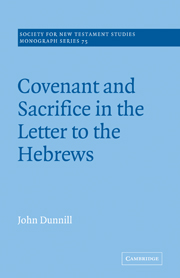Book contents
- Frontmatter
- Contents
- Preface
- List of abbreviations
- A NOTE ON TRANSLATIONS
- Introduction: Hebrews and historical criticism
- Part I Sociology
- Part II Structuralism
- Part III Renewing the covenant
- 4 A liturgy for the Day of Salvation
- 5 The narratives of the covenant
- 6 The testing of the Son of God
- 7 The necessity of blood
- 8 Worship in the new covenant
- Conclusion
- Bibliography
- Index of passages quoted
- Index of modern authors
- Subject index
5 - The narratives of the covenant
Published online by Cambridge University Press: 07 January 2010
- Frontmatter
- Contents
- Preface
- List of abbreviations
- A NOTE ON TRANSLATIONS
- Introduction: Hebrews and historical criticism
- Part I Sociology
- Part II Structuralism
- Part III Renewing the covenant
- 4 A liturgy for the Day of Salvation
- 5 The narratives of the covenant
- 6 The testing of the Son of God
- 7 The necessity of blood
- 8 Worship in the new covenant
- Conclusion
- Bibliography
- Index of passages quoted
- Index of modern authors
- Subject index
Summary
There is a great deal in the Old Testament which, for whatever reason, appears arbitrary and strange, even though scholarship shows that the text we possess is the end product of a long history of editing laws and traditions in accordance with preferred patterns of practice and theology. In Hebrews as in Jewish tradition we see at work the continuing process of interpreting the arbitrary contents of cultural memory into conformity with a unified system of thought and practice, in which the concept of ‘covenant’ functions as an organizing principle. Within the overlapping and interacting contexts supplied by the six spatio-temporal locations described in chapter 4, Hebrews develops its theology of covenant less by direct discursive argument than by reference or allusion to a network of ritual and narrative symbols drawn from this memory (written and oral), selected and deployed in a fashion which itself, however, often seems arbitrary. The aim of the exposition which follows will be to show that the real difficulty is caused by interpretative overload rather than arbitrariness, too much rather than too little meaning. This is material which has been formed and reformed, and appropriated to new contexts, several times before it reached Hebrews. It functions here as the quasi-liturgical recital of the covenant-traditions, the history of the ‘covenant-people’ which the letter addresses; though not organised chronologically, but through theological and symbolic association, it is the memory appropriate to standing before God.
- Type
- Chapter
- Information
- Covenant and Sacrifice in the Letter to the Hebrews , pp. 149 - 187Publisher: Cambridge University PressPrint publication year: 1993

